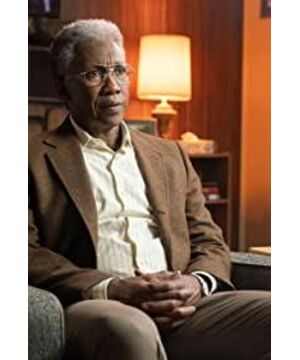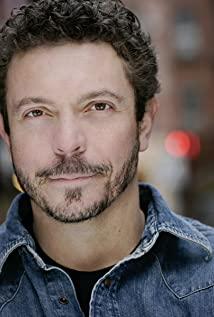The positioning of "True Detective" has never been just a detective drama.
Season three is more ambitious than ever. Not only does this season explore a variety of issues (race, gender, sexuality, war, corruption, bureaucracy, etc.), but the narrative pulls back and forth in several timelines, amnesia is half-truth, and multiple perspectives complement each other, Conflict with each other and jointly build a confusing memory labyrinth.
The main line of the story is a pair of partners Wayne and Roland team up to solve a crime.
At one point, something seemed to go terribly wrong, and the investigation went in the completely wrong direction again and again, leading to all sorts of completely wrong outcomes (innocents wrongly convicted, suspects accidentally murdered, etc.).
Strangely enough, in the final episode, Wayne and Roland, who found the "truth," received neither the joy of solving the mystery nor the relief of ending. The two were old, tired and dejected.
"What have we been doing for 25 years?"
They didn't seem to do anything and were stuck in place for 25 years.
Was it really just this unsolved unsolved case that kept them in place?
So why do Roland and Wayne feel like their investigations, and their lives, are complete failures, even after finding the truth?
At one point, Wayne and Roland seemed to have serious problems in their lives.
Rather than the truth of the crime, the question that the play wants to explore is: What went wrong? What is it that separates two high-spirited, close-knit young people, one is a lonely alcoholic with only a dog for company, and the other is a half-demented man with a sense of powerlessness and deprivation who can't even understand his own past? elder?
I think the thing that pulled the two of them into the quagmire was actually their identities.
They both happen to be members of disadvantaged groups that are discriminated against: Wayne is black and Roland is likely gay.
It's not the unsolvable crime that has trapped them for 25 years, it's their unfulfilled selves.
The series spent a lot of space describing the discrimination against blacks in American society at that time. In this environment, Wayne inevitably displayed an aggressive defensive stance. Whether at work, in love, or at home, he shows strong inferiority and pride, and sometimes his emotions are close to "victim delusions". At work, when things go wrong, he almost always attributes racism. One of the things Wayne is often annoyed about is why Roland always has more weight in front of his boss/colleague. In fact, this is probably both racial discrimination, but also because his emotional intelligence is much lower than Roland. Even at his closest partner, Roland, Wayne sometimes lashes out, accusing him of discriminating against him (actually Roland respects and admires him a lot). Emotionally, Wayne often complains that he has never gone to college, has never seen the market (has never been to fashionable places such as San Francisco), and often accuses the other party of looking down on him. After marriage, he was extremely sensitive to his wife's actions. When Amelia went to the police station, she just made up a few nonsense and dressed a little more beautifully, and Wayne had a straight cancer attack in an instant. , The behavior of telling rape jokes at every turn, Amelia is even whiter than the white lotus).
The root of all the above behaviors is Wayne's sense of inferiority. In a repressed social atmosphere, as a disadvantaged group that is discriminated against, it is impossible to escape the constant pursuit of this inner demon. Wayne can't forget coming back from the Vietnam War. Not only was he not regarded as a hero who came home in triumph, but he got off the plane and was cursed by anti-war people (in his mind, he was equivalent to a hipster who had seen the world and was highly educated like Amelie). Interestingly, when he traces this matter, the point he accuses of Amelia is: You are whiter than my partner (Roland, white). If we analyze the facts carefully: First, anti-war people curse the soldiers, this is a matter of political stance, how much does it have to do with skin color? Second, the point of Wayne's anger/inferiority is that Amelia is more sexually attractive (beautiful) than him, more literate than him, more experienced than him, and suspected of using him. These four things have nothing to do with skin color, And Amelia is also black at all, why did Wayne finally say: You are whiter than my partner? This passage makes it clear that Wayne has a subconscious tendency to blame skin color for everything. The case was not solved smoothly, the boss was unfair, the quarrel with my partner, the girlfriend caused me to lose my job, all "because I am black". In good times, he may be able to withstand this kind of pressure and pain, but when things go wrong in life, this self-limiting and victim mentality finally burst out completely. Those years of pain and anger overwhelmed Wayne, So he gave up on himself, gave up the career he loved, and made a mess of the family.
And Roland's problem isn't skin color, it's sexuality.
Although the episode didn't specify it, I think Roland is very likely to be a deep cabinet. Maybe he hasn't really had an intimate relationship with the same sex in his life, but he seems to have a vaguely ambiguous relationship with Tom and Wayne.
Roland sat on the sofa to see Tom's appearance on the night when Tom was staying, the atmosphere when he and Tom held hands in prayer, when Tom said he was going to disappear, he reluctantly insisted on leaving his private phone number with Tom, and He said to Wayne more than once with a gun and a stick, and it seemed to reveal a bit of ambiguous atmosphere. When the 1990s case resumed, Roland was still in a state of blooming career and love, very sober, and very high-spirited (but even during this time, when asked when he planned to marry his girlfriend, the atmosphere suddenly became strangely awkward, It shows that he and his girlfriend may not be as harmonious as they seem). Roland's sudden onset of alcoholism happened right after Tom's death (of course, you could say it's because he had a bad case and guilt, or because he was sad about losing a friend. It's all possible. But the '80s case Roland didn't collapse when it didn't go well, why is he suddenly so sad and decadent this time?) The more clear evidence is that when Roland was sad, he went to the bar and picked a big guy, and then for no reason He made a lot of heterosexual discriminatory remarks (the main content is, I have never understood why human beings are trying so hard to reproduce there, why you can have such a good time with such an ugly woman, so on and so forth). This self-destructive provocation made him bruised and bruised as he wished. Of course, perhaps Roland's meltdown was largely the result of murderous guilt. But his alcoholism must have started after Tom died and before the murder (and broke up with his girlfriend around this time, and then he seems to be orphaned until old age). It was probably not just the murder that overwhelmed him at this point, but also the desperation that Tom died and there was nothing he could do, and the pain of breaking with Wayne. The most important thing is that there are many ways to find fights. Why does he choose to attack heterosexuals?
From a case-by-case point of view, what really plunged Wayne and Roland's lives into the abyss was the accidental killing of Harris. But the cause of this incident, in my opinion, is by no means a simple accident or the desire to solve the case.
Wayne was about to give up the detective job he loved at the time. His low self-esteem, his pride, his anger, his sense of loss of control over his family business and many other aspects made him enter a state of obsession - no matter what he did, Whatever the cost, the truth must be found now. Wayne's proposed action plan is not only extremely unreliable (even if a confession is forced, nothing can be done without direct evidence), but it is extremely dangerous. A sane and moderate Roland would never agree to such a plan under normal circumstances. So, the obsessed Wayne decided to take advantage of Roland's weakness. He repeatedly mentioned Tom's death, repeatedly mentioned that he wanted to get justice for Tom, etc., the wording was extremely strong, and the incitement intention was extremely obvious. Apparently Wayne had already sensed Roland's ambiguous feelings for Tom, and by doing so, he was viciously manipulating and using his partner to take pointless risks with him. Roland knew that his partner was deliberately provoking him, but he still accepted this stupid plan - to lynch Harris. From the first few episodes, we know that this pair of partners is often tortured to extract confessions, and they should know how serious they are. But on this night, Roland struck Harris so hard, it's not hard to imagine that he was not only drunk, but seriously out of control and irrational. The root of Roland's emotional outburst is his sexuality, his feelings for Tom (and perhaps his feelings for Wayne). Because of his out of control emotions, Roland would be relentless, and Wayne would feel that Harris might really die and must open the handcuffs, so the gun was grabbed and people died. What happened that night was not an accident, but the pain that had accumulated in the hearts of the two for years, and finally destroyed their lives on this night. That terrifying night portrays the true state of two people: They seem to be working hard to solve the case, but in fact they are making no progress. In fact, they are not solving the case at all, they are just venting their anger and pain, using a false obsession to fight against the emptiness and confusion in their hearts,
Why can't he stand up and do what he likes and spend so much time and energy defending himself from insults? Is it because of his skin color?
Why can't he express his love to the person he likes, but try to pursue the person he doesn't like so much, and sit on pins and needles when someone asks about the wedding date? Is it because of his sexuality?
There are no answers to these questions, or even no way to ask them. They can only project the pain and confusion of nowhere to be placed on a dead boy and a missing girl. They hypnotize themselves, thinking that finding the truth and solving the case will solve everything.
In the manslaughter of Harris, Wayne's actions can be described as extremely vicious. When his friend was in the most pain, instead of giving sympathy and comfort, he deliberately stimulated Roland's pain, which eventually led to disastrous consequences. It's no wonder that after many years, he couldn't remember many things, but he remembered this very clearly, and he finally found the opportunity to solemnly apologize to Roland. Judging from the performance of the old Wayne, I think he should never let go and never forgive himself.
But there is a delicate question, why is Wayne being so callous to Roland on this matter? Is he born cold-blooded? Is it because he never had many friends with Roland? I don't think so, the subtle reason is "homophobia".
Instead of showing sympathy, Wayne expressed disgust and contempt rather visibly after learning that Tom was gay, and that he was rejected by his colleagues and lost his job. At this time, Roland, who is usually mild-mannered, rarely explodes (when his partner he trusts, respects, and maybe even has a good crush on) so harshly criticizes another kind of person he has a crush on, and directly pokes his inner secret, how can he Maybe not fried?). I think at that time, or even earlier, Wayne must have guessed Roland's secret (for example, Roland must have liked the rape joke so much that he had to comment on it every time). Since then, there has been an inseparable estrangement between the pair.
It was a very interesting scene when Wayne insisted on quitting the crime team.
How earnestly Roland is trying to keep:
"Do you know how much I've done for you?"
"Don't treat me like this in the future."
"So what about that woman? That's your job—our job, and you're my partner (the word can also be translated as "partner", right) ah!"
"You're gone, what about us?"
And Wayne's answer, how rude and blunt:
"Get away from me!"
"What did you say? It's not like we can't meet again."
I think both of them understand each other in this scene. Wayne is homophobic and disgusted, and since the day he guessed Roland's sexuality, he has tried to distance himself from Roland in various ways. Wayne, who is black, is very sensitive to color discrimination, but he discriminates against other disadvantaged groups (homosexuals, women, the latter shows that he never likes his wife's career to surpass himself, and always feels that his wife should cook at home and raise children), but it is not. vague.
But from many other details, I think Wayne is a kind and sincere person (perhaps a little overly self-centered). Wayne's homophobia was caused by the social atmosphere of the time, and it was even related to his black identity. For Wayne, who is sensitive to low self-esteem, the original sin of skin color has made him breathless, and he must avoid another original sin (such as homosexuality) in any case. From this perspective, the breakup of Wayne and Roland is a tragedy of the times.
Years later, when the elderly Roland asked to move in (as it did), Wayne didn't say no. Maybe Wayne has grown up - he's no longer the nervous and angry Wayne, or maybe it's because the social atmosphere at this time is much more relaxed than it used to be. Anyway, I think this scene is very warm. It's reconciliation, it's caring, it's acceptance, it's humanity, and it's a truly effective remedy for a grotesquely wrong past. This scene seems to me as important as finally finding Julie.
I think a lot of people will not like the ending: the case ended so blandly that we can't even be sure that what Wayne thought he had found was the truth. But I think that ending is actually pretty good.
Maybe the truth is not so important. What is important are memories and feelings, those moments when they have invested their hearts that even amnesia can't take away. It was never the absence of truth that trapped them, but regret and loneliness. Only reconciliation and remediation can save them from that jungle.
View more about The Great War and Modern Memory reviews










